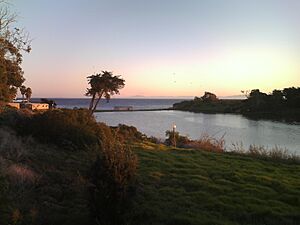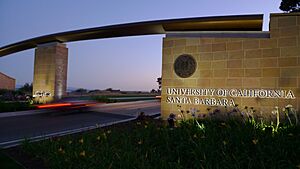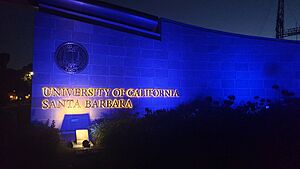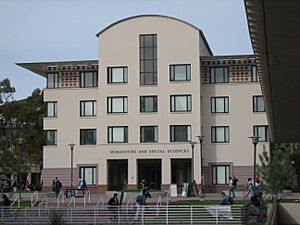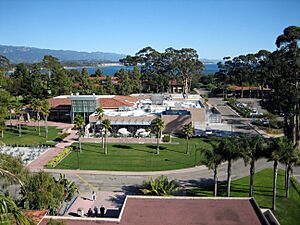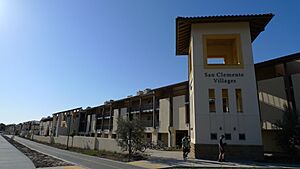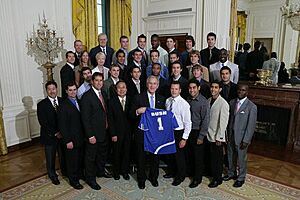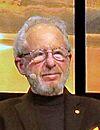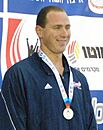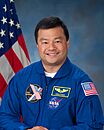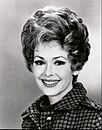University of California, Santa Barbara facts for kids
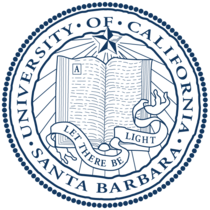 |
|
|
Former names
|
Anna Blake Sloyd School (1891–1899) Anna Blake Manual Training School (1899–1909) Santa Barbara State Normal School (1909–1921) Santa Barbara State College (1921–1944) Santa Barbara College of the University of California (1944–1958) |
|---|---|
| Motto | Fiat lux (Latin) |
|
Motto in English
|
'Let there be light' |
| Type | Public land-grant research university |
| Established | 1891 (1944 as a UC campus) |
|
Parent institution
|
University of California |
| Accreditation | WSCUC |
|
Academic affiliations
|
|
| Endowment | $585.5 million (2021) |
| Budget | $954 million (2019) |
| Chancellor | Henry T. Yang |
|
Academic staff
|
2,749 (Fall 2018) |
| Students | 26,179 (Fall 2020) |
| Undergraduates | 23,196 (Fall 2020) |
| Postgraduates | 2,983 (Fall 2020) |
| Location |
,
,
United States
34°24′59″N 119°50′47″W / 34.41639°N 119.84639°W |
| Campus | Midsize suburb, 1,127 acres (456 ha) |
| Newspaper | Daily Nexus |
| Colors | Navy and gold |
| Nickname | Gauchos |
|
Sporting affiliations
|
|
| Mascot | Olé the Gaucho |
The University of California, Santa Barbara (often called UC Santa Barbara or UCSB) is a large public research university. It is located in Santa Barbara County, California, United States. UCSB is part of the well-known University of California system.
The university started in 1891 as a school for teachers. It joined the University of California system in 1944. This makes it the third-oldest campus in the system for undergraduate students. Only UC Berkeley and UCLA are older. In 2022, about 23,460 undergraduate students and 2,961 graduate students attended UCSB.
UCSB's campus is right on the ocean. It was built on the site of a former WWII Marine Corps air station. The university has three colleges for undergraduate students and two schools for graduate students. They offer over 200 different degrees and programs. UCSB is known for its high level of research. It has 10 national research centers, including the Kavli Institute for Theoretical Physics. Many professors at UCSB have won important awards, like the Nobel Prize.
Contents
History of UCSB
UCSB began in 1891 as the Anna Blake School. This school taught subjects like home economics and industrial arts. In 1909, the state took over the school, and it became the Santa Barbara State Normal School. Later, in 1921, it changed its name to the Santa Barbara State College.
In 1944, people from Santa Barbara worked hard to have the State College join the University of California system. This system focuses more on research. Even though the State College system tried to stop it, the move happened. From 1944 to 1958, the school was called Santa Barbara College of the University of California. Then, it got its current name.
The university grew quickly. In 1949, the campus moved to a larger area in Goleta. This land was once a Marine Corps Air Station Santa Barbara. At first, they thought only a few thousand students would attend. But after World War II, many more students wanted to go to college. So, in 1958, the school became a general university campus. Its name changed to "University of California, Santa Barbara."
In 1959, a famous English writer named Aldous Huxley visited UCSB. He gave a series of talks called "The Human Situation." In 1995, UCSB joined the Association of American Universities. This group includes the top research universities in the United States and Canada.
Leaders of UCSB
The main leader of the school was first called a president. In 1944, when it joined the University of California, the leader's title changed to provost. In 1958, UCSB became a full university campus. The leader's official title then changed to chancellor.
Here are the past leaders:
- Provosts:
- 1944–1946: Clarence L. Phelps
- 1946–1955: J. Harold Williams
- 1955–1955: Clark G. Kuebler
- 1956–1956: John C. Snidecor (acting)
- 1956–1959: Elmer Noble
- Chancellors:
- 1959–1962: Samuel B. Gould
- 1962–1977: Vernon Cheadle
- 1977–1986: Robert Huttenback
- 1986–1987: Daniel G. Aldrich (acting)
- 1987–1994: Barbara Uehling
- 1994–present: Henry T. Yang
UCSB Campus
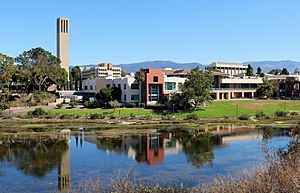
UCSB is built on cliffs right next to the Pacific Ocean. The campus is separate from the local city government. It is very close to the city of Goleta. The campus has four main parts: the Main (East) Campus, Storke Campus, West Campus, and North Campus. These areas surround the community of Isla Vista.
UCSB is one of the few universities in the U.S. that has its own beach. The campus has miles of coastline, its own lagoon, and a rocky point called "Campus Point." There are many paths for walking and biking around the campus, the lagoon, and along the beach. The university also owns a nature preserve called Coal Oil Point.
Many of the early buildings were designed by famous architects. They used special concrete blocks in their designs. A new four-story building is planned to be finished by 2023.
The lagoon is a large body of water near the ocean. It was once a salt marsh. It gets water from both runoff and the ocean. This makes it a mix of fresh and salt water.
The UCSB Libraries have over three million books. They also have many other materials like maps and sound recordings. The main library, Davidson Library, was recently expanded and renovated.
Campbell Hall is the largest lecture hall at the university. It has 862 seats. It is also used for special performances, films, and talks for students and the community.
Storke Tower, built in 1969, is the tallest building in Santa Barbara County. You can see it from most places on campus. It has a large musical instrument called a carillon with 61 bells. The student newspaper, Daily Nexus, and the school radio station, KCSB 91.9, are located under Storke Tower.
The UCSB Family Vacation Center is a summer camp on campus. It started in 1969 and hosts over 2,000 guests each summer. Many UCSB students work there as camp counselors.
Campus Layout
The university is divided into two main areas: West Campus and East Campus. Most of the university's buildings, including classrooms and labs, are on the East Campus. The two campuses are connected by areas to the north. These areas have student housing and sports fields.
The East Campus has two main open areas called quadrangles. The Davidson Library is between them. The western quad has buildings for arts, social sciences, and humanities. The eastern quad has buildings for physical sciences and engineering. The life sciences and psychology departments are also nearby. The lagoon is at the southernmost part of the campus.
Biking at UCSB
UCSB is well-known for its great biking system. A recent survey showed that 53% of UCSB students use bikes to get around. Bikes have their own special paths on East Campus. There are many places to park bikes. Students can register their bikes to help prevent theft. Most biking at UCSB happens within a small area.
Academics at UCSB
UC Santa Barbara is a large university where most students live on campus. It offers many different degrees. The university has five colleges and schools. They offer 87 degrees for undergraduate students and 55 for graduate students. UCSB is the sixth-largest campus in the UC system by student numbers. In 2015, UCSB was named a Hispanic-Serving Institution.
Becoming a Student
It is quite competitive to get into UC Santa Barbara. U.S. News & World Report calls admission "most selective." UCSB no longer uses SAT or ACT scores when deciding who gets in or for scholarships.
For the 2022 freshman class, 111,006 students applied. About 25.8% of them were accepted. The average high school GPA for admitted students was 4.29.
Research at UCSB
UCSB spends a lot of money on research and development. In 2020, it spent $235.3 million. Much of this funding comes from organizations like the National Science Foundation and the Department of Defense. Companies like Raytheon and Lockheed Martin also partner with the College of Engineering for research.
From 2005 to 2009, UCSB was ranked fourth in the U.S. for how often its research was cited by others. This shows its important impact on science.
UCSB has 12 National Research Centers. These include the Kavli Institute for Theoretical Physics. Eight of these centers get support from the National Science Foundation. UCSB is also home to Microsoft Station Q. This group works on advanced quantum computing.
Teaching and Degrees
The University of California system focuses on research. UCSB teaches students through lectures. Larger classes often have smaller discussion groups. For undergraduate students, UCSB offers Bachelor of Arts (B.A.) and Bachelor of Science (B.S.) degrees. Music students can earn a Bachelor of Music degree.
Graduate students take seminar-style classes and focus on research. UCSB offers Master of Arts (M.A.), Master of Science (M.S.), and Ph.D. degrees. Music students can get a Master of Music (MM) or Doctor of Musical Arts (DMA) degree. Students studying education can earn a Master of Education (MEd) or Doctor of Education (EdD) degree. In 2010–2011, the university awarded over 5,800 bachelor's degrees.
University Rankings
UCSB is considered a "Public Ivy". This means it's a public university that offers a top-notch education like the private Ivy League schools.
In 2022, U.S. News & World Report ranked UC Santa Barbara as the 7th best public university in the United States. It was tied for the 32nd best university overall. Money magazine ranked UCSB 30th in the U.S. in 2019. This ranking looked at 744 schools.
Kiplinger ranked UCSB 30th among public colleges for best value in 2019. It was fifth in California. In 2018, UCSB was ranked 32nd in the U.S. for how well it helps students move up in society.
Research Impact Rankings
The Times Higher Education World University Rankings placed UCSB 48th worldwide in 2016–17. The Academic Ranking of World Universities (ARWU) ranked UCSB 42nd in the world in 2016. It was 28th in the nation.
The United States National Research Council rankings looked at graduate programs. Ten UCSB departments were in the top ten in the country. These included Materials, Chemical Engineering, and Physics.
A study by Leiden University in the Netherlands ranked UCSB as the seventh-best research university in the world. This was based on how often its research was cited.
Other Rankings
U.S. News & World Report also ranked UCSB's graduate programs in 2016. Materials Engineering was ranked second best in the U.S. Chemical Engineering was ninth. Physics was 10th best.
UCSB's Department of Communication was recognized as a top department in the nation. It was ranked first for Interpersonal and Small Group Communication. It was also first for Intercultural/International Communication.
In 2015, QS World University Rankings placed UCSB 129th in the world.
Forbes magazine ranked UCSB 114th in the nation in 2016. This ranking often favors liberal arts colleges.
PayScale's 2015–16 College Salary Report looked at how much graduates earn. UCSB ranked first in computer science and seventh in engineering.
In 2015, The Princeton Review listed UCSB as third on its list of top party schools.
University Organization
Santa Barbara is one of the ten main campuses of the University of California. The University of California is managed by a group called the Board of Regents. The Governor of California appoints most of its members. The position of chancellor was created in 1952 to lead each campus. Henry T. Yang became the fifth chancellor of UCSB in 1994.
Colleges and Schools
UCSB has three colleges:
- College of Creative Studies (started 1967)
- College of Engineering (started 1966)
- College of Letters & Science (started 1958)
The College of Creative Studies offers a different way to learn. It supports advanced, independent work in arts, math, and sciences.
UCSB also has two professional schools:
- Bren School of Environmental Science & Management (started 1991)
- Gevirtz Graduate School of Education (started 1961)
Institutes and Programs
The Institute for Social, Behavioral, and Economic Research (ISBER) was founded in 1973. It is the research center for social sciences and humanities.
In 2015, UCSB opened The Confucius Institute. This institute helps promote the study of Chinese language and culture.
The Institute for Energy Efficiency was started in 2008. Its goal is to bring together different research projects on energy efficiency.
Academic Year
The university uses a quarter system. There are three main terms in the school year: fall, winter, and spring. There is also a summer term. Each term has about 146 days of instruction. At the end of each term, there is a week for final exams.
Student Life and Traditions
Social Life
UCSB is a campus where students are often involved in politics. For the 2008 presidential election, UCSB won a national contest for student voter registration. Over the years, many political groups have been active on campus.
There are many groups and centers for students. These offer social, fun, religious, and career-focused activities. The UCSB Multicultural Center hosts events to support students of color. It also helps promote awareness of diversity. Other groups include The Daily Nexus (the student newspaper) and KCSB 91.9 (the school radio station).
The UCSB Recreation Center offers many activities. These range from adventure programs to ballroom dancing classes. Hillel provides a place for Jewish students to gather. Students also hang out at places like the Arbor and the University Center (UCen).
UCSB is famous for its yearly free music festival, Extravaganza. It happens in the spring and usually draws about 8,000 people. Many famous artists have performed there.
Fraternities and Sororities
UCSB has many fraternities and sororities. These are social organizations for students. They are part of different councils like the United Sorority & Fraternity Council (USFC) and the Inter-Fraternity Council (IFC).
Student Housing
There are eight residence halls at UCSB. Seven are on the main campus. One, Santa Catalina, is near the West Campus.
The main campus residence halls are in two areas. On the east side are halls named after five of the Channel Islands. These include Santa Rosa and Santa Cruz. There are two dining halls nearby.
The other two residence halls, San Rafael and Manzanita Village, are on the west side. They mainly house older students and transfer students. Manzanita Village was finished in 2002.
The university also has housing for graduate students and families. Sierra Madre Villages, finished in 2015, is the first residential complex in the UC system to be certified as LEED platinum. This means it is very environmentally friendly.
A new dormitory, Munger Hall, is planned to house many more students. It aims to help more students live on campus.
Some students live off-campus in nearby communities like Goleta and Isla Vista. Parking on campus is limited for students who live close by. So, many students who live off-campus ride bikes to class.
Student Services
The university offers many academic resources. These include a writing center, computer labs, and career counseling. Students can also get academic advice.
The UCSB Recreation Center has pools, racquetball courts, a rock wall, and exercise machines. The University Center has meeting rooms, a bookstore, and restaurants.
UCSB has its own health clinic. Students can see a doctor there for medical help. The university is the only UC campus with its own paramedic rescue unit. This unit has professional paramedics and student EMTs.
Athletics and Sports
The mascot of UCSB is the Gaucho. The school colors are blue and gold. UCSB's sports teams compete in the Big West Conference. Some teams, like men's water polo and men's volleyball, are in the Mountain Pacific Sports Federation.
UCSB is well known for its men's swimming and men's soccer teams. In 2006, UCSB won its first NCAA men's soccer title. This was the school's second overall NCAA championship.
Besides official sports teams, over 700 students play in club sports. These include Alpine racing, cycling, and rugby. Many of these teams are highly ranked. For example, the rowing team has produced several national team members. The UCSB cycling team has also had Olympians.
Hundreds of students also take part in intramural sports. These are fun, organized games between students. They include basketball, soccer, and volleyball.
Surfing is also very popular at UCSB. The campus beaches have good surfing spots. UCSB has a surf team that competes in national competitions. They won their 14th national title in 2010.
Notable People from UCSB
Famous Faculty
Many professors at UCSB have won important awards. These include six Nobel Prizes and a Fields Medal. Also, many are members of the National Academy of Sciences and the National Academy of Engineering.
- Current UC Santa Barbara Nobel laureate faculty include:
-
Shuji Nakamura, Nobel Prize in Physics (2014), recipient of the 2006 Millennium Technology Award and the 2012 Technology and Engineering Emmy Award
-
Finn E. Kydland, Nobel Memorial Prize in Economics (2004)
-
David J. Gross, Nobel Prize in Physics (2004)
-
Alan J. Heeger, Nobel Prize in Chemistry (2000)
-
Herbert Kroemer (1928-2024), Nobel Prize in Physics (2000)
Famous Alumni
Many UCSB graduates have become famous in different fields. Carol Greider, who won the Nobel Prize in 2009, studied biology at UCSB. Robert Ballard, the oceanographer who found the RMS Titanic, also graduated from UCSB.
Actors who went to UCSB include Academy Award winner Michael Douglas. He studied drama. Gwyneth Paltrow also studied anthropology there before becoming an actress.
Filmmakers like Don Hertzfeldt and Gregg Araki studied at UCSB. Gavin Garrison, who produces the Emmy-nominated show Whale Wars, is also an alumnus.
Musicians like Robby Krieger from The Doors and singer-songwriter Jack Johnson attended UCSB.
Jeffrey O. Henley, chairman of the Oracle Corporation, graduated with a degree in Economics. Knut Vollebæk, a former foreign minister of Norway, studied Political Science.
Athletes include Olympic gold medalist swimmer Jason Lezak and NBA coach Brian Shaw. Journalists like Katy Tur and Elizabeth Wagmeister also graduated from UCSB.
- Notable UC Santa Barbara alumni include:
-
Carol Greider, Nobel Prize in Physiology or Medicine (2009)
-
Gwyneth Paltrow, Academy Award-winning actress
-
Michael Douglas, Academy Award-winning actor and producer
-
Robby Krieger, rock guitarist and songwriter in The Doors
-
Jack Johnson, singer-songwriter and former professional surfer
-
Benjamin Bratt, American actor
-
Barbara Rush, Golden Globe Award-winning actress
Images for kids
-
The Storke Tower and the University Center in front of the UCSB Lagoon.
-
2006 NCAA soccer champions visit President George W. Bush at the White House
See also
 In Spanish: Universidad de California en Santa Bárbara para niños
In Spanish: Universidad de California en Santa Bárbara para niños


